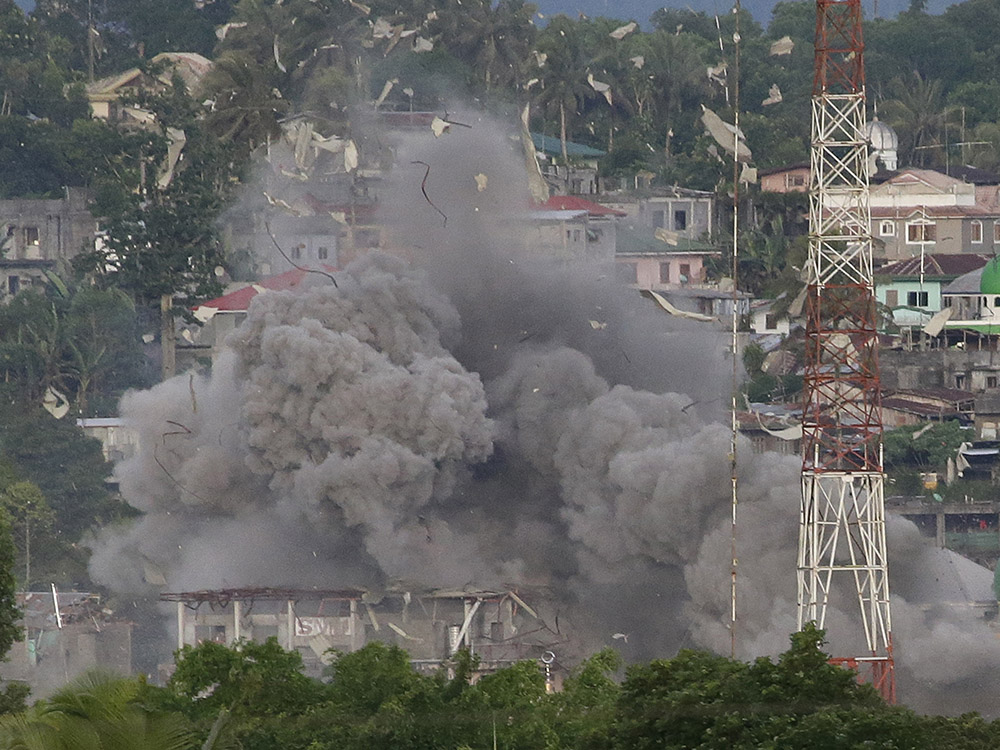Marawi siege 'most serious terror event' in Southeast Asia in past 15 years

The siege of Marawi City is the most significant terror event to have struck Southeast Asia in the past 15 years, according to an Australian expert. AP/Aaron Favila, File
MANILA, Philippines — The siege of Marawi City which began in May is the most significant terrorist event in Southeast Asia in the last 15 years, according to an expert on the region’s politics, highlighting the deficiency of the Philippine military and beginning what could be a long-term security threat to the Philippines and neighboring countries.
The clashes in Marawi, which prompted President Rodrigo Duterte to place Mindanao under military rule, has provided Islamist militants involved in the fighting stature among radical communities for successfully mounting the most prominent display of jihadist force of the so-called Islamic State fighters in the region, according to Greg Fealy of the Australian National University.
“The battle for Marawi is the most significant terrorist event in Southeast Asia since the Bali bombings of 2002, which killed 202 people,” he said, referring to the terror attack on the popular tourist island in Indonesia.
The fighting has also highlighted the weakness of the Armed Forces especially in engaging in urban combat, according Fealy. The Philippine military has been supported by American advisers as well as US and Australian intelligence operations, highlighting the “assymetrical nature of the conflict,” the expert said.
The American military is also training a handful of Filipino soldiers in urban warfare, despite Duterte’s past attacks on the presence of US troops in the country.
“[T]he Philippine armed forces have been exposed as poorly prepared for urban combat and quite unable to deliver on their promises of a quick and comprehensive routing of the insurgents,” he said, in stark contrast to the performance of the Islamist fighters who have been far more resourceful and well prepared for their urban operations than originally anticipated.
Fealy said of the militants: “They have proven to be expert at using IEDs, ambushing techniques and snipers to kill and unnerve Philippine soldiers.”
“They have also stockpiled large quantities of food and ammunition, and have been able to get more fighters and supplies into their Marawi stronghold despite the government’s attempts to seal off the area.”
Another reason for this serious assessment of the Marawi conflict was the possibility that Isnilon Hapilon, the appointed emir of the so-called IS in Southeast Asia, would be able to attract new recruits, many of whom young and well educated but largely disaffected with other Muslim groups in Mindanao seen as having sold out by entering into peace negotiations with the government.
“[T]he longer the Marawi jihadists frustrate the Philippine forces and their US advisers, the greater will be their stature among jihadist communities across the region and beyond,” he said.
The Australian expert warned that the so-called IS may declare Mindanao as a province, the first area to be declared so in Southeast Asia, adding that the central command has aided its supporters in Marawi with funding and praise on its official media outlets.
In July, a report by the Institute for Policy of Analysis of Conflict said that IS central provided the militants’ Marawi operations with periodic transfers of thousands of dollars, providing a link between the fighters and the retreating radical group in the Middle East.
Fealy said that reports indicated that a growing number of radical group’s supporters were seeking to travel in Mindanao to participate in the hostilities.
“As conditions worsen for IS in Syria and Iraq, more IS partisans in Asia are likely to regard Mindanao as a legitimate alternative,” he said.
A longer-term risk for the region is that the fighting has not only provided Islamist fighters technical expertise but also prestige to a new generation of jihadists across the region, said Fealy. This knowledge can then be passed on to other terror cells, he added.
Since the fighting in Marawi began on May 23, hundreds of soldiers, civilians and Islamist militants have been killed. More than 200,000 families were also displaced by the clashes.
Ground and air assaults by the AFP have failed to decisively end the battle which has already entered its fourth month despite Duterte’s declaration of martial law in the region and the pouring of thousands of soldiers and resources.
The destruction of Marawi’s central district has already been likened to the destruction of the Iraqi city of Mosul after the so-called IS took it in 2014.
Duterte has promised P20 billion to rehabilitate the Islamic City, but this process has been hampered by the continuous fighting.
- Latest
- Trending


























